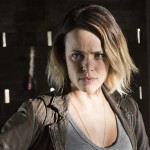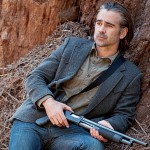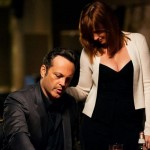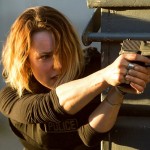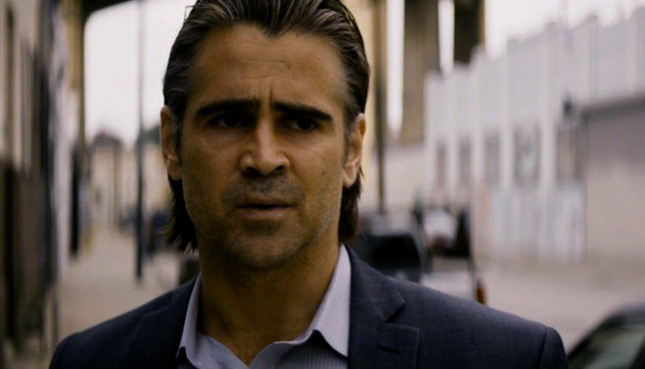
Turns out Dixon wasn't kidding when he told Ray to burn all his shit.
Time hopping forward a couple of months, after last week's blood-soaked finale, we find our detectives scattered to the professional winds. Ani has been busted down to the evidence room, and Ray has quit the Vinci PD altogether to work for Frank. Woodrugh is defending his innocence, batting away insinuations that he's a kill-crazy loose cannon responsible for egregious body counts during his time in Afghanistan and during the shootout in Vinci — not to mention the accusations of sexual coercion from the coked-out blonde he pulled over in the first episode. Meanwhile Frank, having downsized to a smaller house, is facing ominous threats from all sides. He's desperately searching for the nameless anyone (and perhaps confidant) that's trying to fuck him, who isn't his wife. "It's like blue balls, in your heart," he tells Ray. Goddamn Pizzolatto.
That kind of line is hardly the only example of clunky dialogue that peppers the often dense exposition of this True Detective, and it's easy to forget how goofy Rust Chole would have sounded if he weren't being played by McConaughey. But in the end, it's been the performances that have been keeping this season from going off the rails.
"Other Lives" continues weaving the multitudinous plot threads of the season into a recognizable rope, a trend that made the last episode feel more cohesive. Tantalizing clues are dropped with more immediacy. Ray learns of the connection between Dr. Pitlor (Rick Springfield?!) and Chessani's Lodge. The convoluted machinations of the real estate deal further reveal themselves, as Ray and Ani wonder why poisoned farmland is suddenly worth millions. A party invitation, Caspere's missing blue diamonds (perhaps bought with Frank's millions?), and pictures of a state senator at a "hooker party" lead them even further down a rabbit hole of hidden webs and whispered debauchery.
Red herrings, double crosses, back room deals, horny politicians, cosmetically altered prostitutes, and one good old-fashioned ass kicking cement the L.A. noir bonafides at play. They don't feel particularly organic, since Pizzolatto is more interested in character study, unspooling the hints and clues to the larger story in an almost perfunctory way. Perhaps that's a byproduct of the changing directors, none of whom so far having evoked the same sense of enticement for Pizzlatto's more shadowy narrative sensibilities. John Crowley is in the chair this time out, and he's fine. This whole season has that "for hire" feeling that was absent from the first. It's in the direct relationships that he crafts between the characters where Pizzolatto's writing feels the most propulsive and immediate.
Despite Jordan's one-note baby fever, the heart-to-heart she and Frank have about that very point is moving and genuine, punctuating the chemistry and sense of broken history between them. Meanwhile, Ray's realization, and the confrontation with Frank that it promises, already has me waiting for Sunday again. Ray's pissed, and if history is any guide, that's going to pay off. Even Woodrugh's weird, and seemingly superfluous, relationship with his mother is becoming more compelling. And uncomfortable.
Again, it's the performances that are carrying the weight here. The problems that plague this season: uneven pacing, an overabundance of characters and byzantine plot threads that don't always feel like they're hitting their marks, and that sense of humorless self-seriousness, are still present and accounted for. But Vaughn, Reilly, Farrell, McAdams, and Kitsch are making the most of it, selling even the most overwritten lines like champs. And Rick Springfield is killing it so hard I didn't even realize that was him until tonight. Who would have thought "chameleon-like" would ever become a way to describe Rick Springfield?
With only three episodes left, there still feels like a lot of narrative ground to cover. But it also feels like we'll find out if the choices Pizzolatto has made — inverting the tone of his heirloom creation into something so familiar and traditional — will pay off in a way that makes the trip worthwhile. Having been mildly underwhelmed so far can only help cushion the blow if True Detective doesn't stick the landing.

